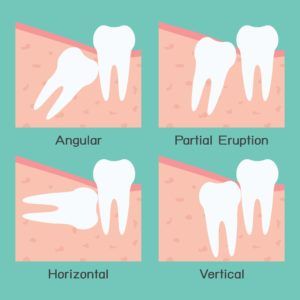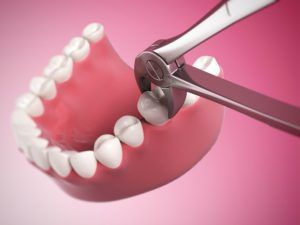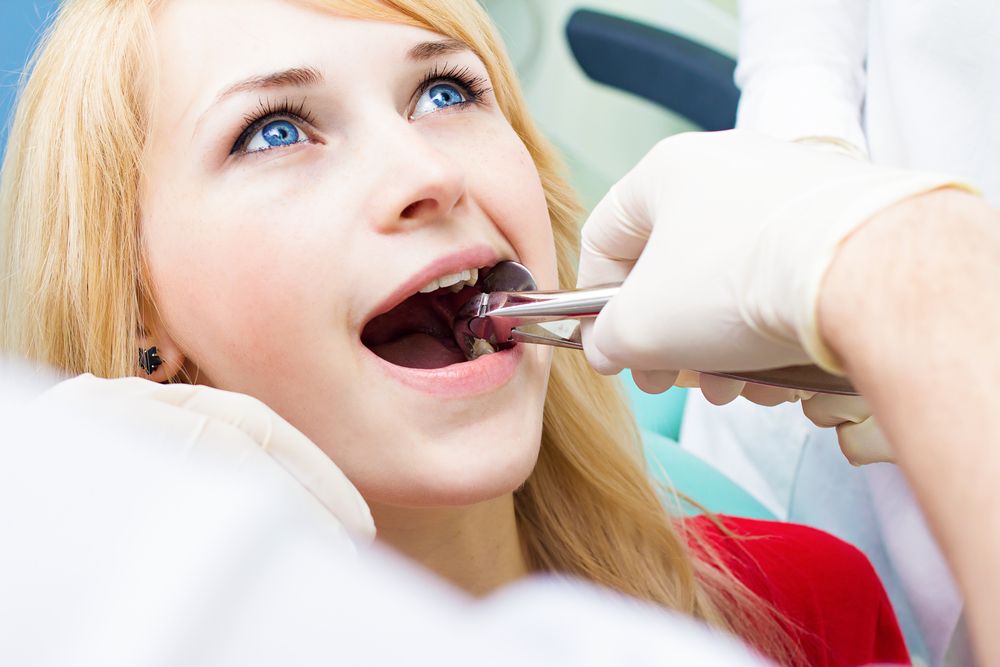Although Ace Dental is primarily concerned with preserving your natural teeth through restorative dentistry, there may be cases where the decay or damage is too severe to save the tooth. In these cases, a tooth extraction, or removal of the affected tooth, may be required to prevent damage to the surrounding teeth or gums.
Did You Know?
Even though tooth extractions take place inside your dentist’s office rather than a hospital, they are still considered to be surgical procedures. Nevertheless, they don’t last long and you will be able to return home once your procedure is over.
Frequently Asked Questions:
Why would I need to have a tooth extracted?
One of the most common reasons for a tooth extraction is to remove partially or fully impacted wisdom teeth. Impacted wisdom teeth can cause a variety of symptoms including: bleeding gums, swelling in the gums and around the jaw, pain or tenderness towards the back of the mouth, headaches, and swelling of neck glands.
Other common reasons for a tooth extraction can include: teeth that are severely damaged or decayed, as well as bone loss around the tooth. Severe tooth decay can infect the inside of the tooth and cause its roots to abscess. This, as well as periodontal disease, can cause the tooth to loosen and bone loss to occur. When this happens, often the teeth begin to shift into positions that can cause pain while also providing minimal support. For these reasons, extraction is usually the best treatment.
What is an impacted wisdom tooth?

An impacted wisdom tooth is a third molar that is unable to fully erupt from below the gum line. When it comes to impactions, there are different names for them depending on the direction the tooth is facing. A horizontal impaction is when the tooth is sitting horizontally below the gum line and is moving towards the adjacent molar. This is one of the most painful types of impactions and will generally require surgery.
Other types of impactions that usually require surgery are distal and mesial. Both distal and mesial impactions are a type of angular impaction where the tooth may be partially erupted. Distal impactions are when the tooth is angled towards the back of the mouth, and mesial impactions are when the tooth is angled towards the front of the mouth.
The final type of impaction, vertical impaction, is when the tooth is in the correct vertical position, but has not yet broken through the gum line. Depending on the situation, vertical impactions may or may not require extraction.
Do I need to prepare for my extraction appointment at Ace Dental?
Our office will help you prepare for your extraction appointment during your pre-op appointment. A pre-op appointment is necessary to discuss your treatment, as well as your medical history and current medications. This information is not only important for your treatment, but it will help us determine what level of sedation to use as well.
During your pre-op appointment, we will also discuss your responsibilities the night before your procedure. For example, most sedation methods require that you do not eat or drink anything after midnight. Some sedation methods may also require that you start taking medication the night before. Also, there may be some situations where you need to take antibiotics or pain medication the night before to prepare for your procedure. All this information will be discussed and any questions you have will be answered.
The morning of your procedure, you should arrive to our office on time in loose-fitting, comfortable clothes and close-toed shoes. You will also need to have a driver bring you and stay to take you home after. Before begining the procedure, we will check your vitals and make sure you are well. If you are sick in any way, your procedure will be rescheduled for your safety.
What happens during a tooth extraction at Ace Dental?
Most of what happens during a tooth extraction will be a blur to you because you will be sedated and anesthetized. This means that you will be kept comfortable during your procedure and may have very little memory, if any, of what happened.

Nevertheless, it is important that you know the basics of how a tooth extraction procedure works. For starters, there are two different extraction techniques that may be used depending on your case. If the teeth in need of extraction are completely erupted, then they will be extracted with a simple extraction technique. During a simple extraction, a dental tool called an elevator is used to loosen the tooth from the socket. Once loose, forceps can then be used to lift it out of the mouth.
If the tooth in need of extraction is partially or fully impacted, then it will likely require a surgical extraction. Surgical extraction includes first making a tiny incision in the gum to access the tooth. Once the tooth is accessible, it will be fragmented and each piece will be removed until the entire tooth is gone. This method ensures that there is less trauma and a decreased risk of damage to the surrounding structures.
Will I have any post-op guidelines to follow after my tooth extraction?
Yes, you will have post-op guidelines to follow. Once your procedure is over, you will remain in our office briefly until the sedation begins to wear off. You will likely have cotton packed into your mouth. The first guideline you will need to follow is to keep this cotton in place, despite the fact that it is uncomfortable and will probably make your mouth feel dry.

After you leave our office, you will need to spend the first 24 hours relaxing and drinking plenty of liquids. You will also need to avoid alcohol, strenuous activity, spitting or rinsing, and consuming hot (temperature) or spicy foods or beverages. You will need to start out eating soft foods and then gradually progress to harder foods as your extraction site heals.
For the first week, you will also need to avoid sucking or drinking from a straw, as this can dislodge the blood clot in the extraction site. When this clot becomes dislodged, a condition called “dry socket” can occur. Dry sockets are painful because the nerve is exposed.
You will also need to take all pain medications and antibiotics as prescribed to ensure proper healing and pain managment. Ice packs can also be used in the first 48 hours for 15 minutes on and 15 minutes off. After that, heat can be used for 20 minutes on and 20 minutes off.
Dr. Pushpa Sachdeva has been providing some of the best dental care in Nairobi for over 33 years. For comprehensive, family-friendly dental care for all ages, schedule a consultation at Ace Dental Care today!




